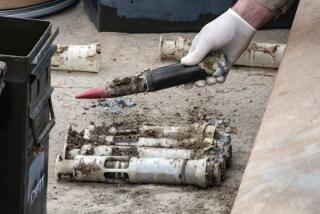No Market for Sellers of Plutonium : Nuclear weapons: Reports exaggerating the terrorist risk are needlessly alarmist.
- Share via
Recent arrests by German authorities prove that there are people with access to Russian stocks of plutonium who are willing to sell. The arrests do not prove the existence of a nuclear black market. A market requires both sellers and buyers. In this case, the only buyers appear to have been German police. Are there others?
The popular literature leaves the impression that there are a vast number of malevolent governments and others whose itch to acquire nuclear weapons has been frustrated only by the difficulty of acquiring the necessary materiel. With the fall of the Soviet Union, the impoverishment of its once mighty scientific community, rampant corruption and growing organized crime, this view has changed. We now see sellers--like those arrested in Germany--but ask who the buyers might be.
On the basis of motive alone, buyers are legion. They range from inmates of mental hospitals to nations convinced that their survival depends on nuclear weapons. The nations mentioned most often include Iran, Iraq, Libya, Syria, Pakistan, Algeria, North and South Korea, Taiwan and, in the past, Argentina and Brazil. Libya’s Moammar Kadafi reportedly has offered millions to acquire a nuclear weapon. Israel is believed to have nuclear weapons, fabricated in part with materiel obtained covertly. There are unconfirmed reports that Iran obtained some of the nuclear warheads that had been stored in Soviet Central Asia. Before the Gulf War dashed Saddam Hussein’s nuclear ambitions, Iraq may have progressed further in its secret weapons-development program than intelligence analysts have estimated.
Belligerents in current wars might also be included in our nuclear market survey. There are today between 30 and 40 armed conflicts in the world. Driven by historic hatred or religious extremists, ethnic cleansing and other atrocities characterize the fighting. Ethnic foes are easily dehumanized; I have no doubt that had the bombers of the World Trade Center in New York somehow possessed a nuclear weapon, they would have detonated it.
But even those we label terrorist often operate under self-imposed constraints. They have always had the capacity to kill more people than they do, but generally, they have not done so because they fear it might alienate constituents, cause too much public revulsion and provoke government crackdowns with popular support.
To say that some fanatic might use a nuclear weapon if he had one handy does not make a market. Beyond fanaticism and hatred, terrorist buyers of nuclear materiel would also require enormous financial resources, organization, international connections, operational autonomy, scientific know-how and total security. The effort to obtain the materiel and fabricate a device would require months, possibly years. Applying these criteria makes it hard to identify a qualified buyer among today’s terrorist groups.
Organized crime might meet the organizational criteria, but the motives would be primarily economic. And unlike cocaine, there is no ready market for plutonium. It is hard to imagine the Sicilian Mafia or Japan’s Yakuza resorting to nuclear weapons as a means of extortion or deterrent to the police. Organized crime is more likely to buy nuclear materiel to sell it, which brings us back to the question. Who are the ultimate buyers?
Selling plutonium can be compared to selling a stolen Rembrandt masterpiece--the goods are hot, the buyers few. We have no evidence that any terrorists ever sought to acquire nuclear weapons. Although terrorism has become bloodier as terrorists increasingly resort to more indiscriminate attacks, principally car bombs, there is no inexorable trend toward weapons of mass destruction.
More to Read
Sign up for Essential California
The most important California stories and recommendations in your inbox every morning.
You may occasionally receive promotional content from the Los Angeles Times.













